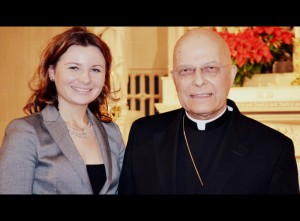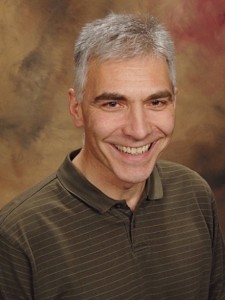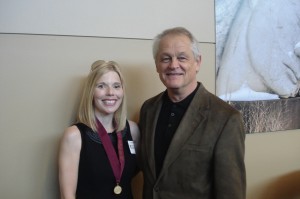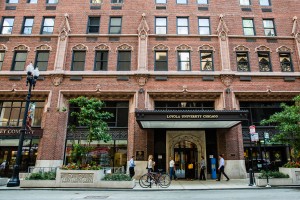In a beautifully crafted reflection, Brian Anderson explores the struggle of redefining peace within tense times.
His thoughts and message arose from the recent divestment issue surrounding Loyola, but hold true for a lot of issues that individuals, various groups and our country as a whole are facing today.
As the Interfaith Campus Minister for Loyola’s Campus Ministry, Brian understands that there will always be tension, but the response to such unrest should come from open minds and open discussion. Creating interfaith dialogue is essential.
Read his post below and share any thoughts or questions you may have in the comment section below.
In Tension Lies a Hidden Harmony
These past few weeks in Campus Ministry, my job has been very emotionally busy. Normally, I come to work and have a to-do list for upcoming programs and events that I’m working on with my students. However, with the issue of divestment being discussed in the Student Government Loyola Chicago (SGLC), much of my energy was focused on being present to students on both sides of the issue. They came to me with their anger, frustration, and fear. They came to me wanting a space to be heard, to be recognized and most importantly, how to find a peaceful solution to this issue.
And so I did the best I could to be an open ear and a safe space for their emotion. But what I did not do, or at least not yet, is serve as a conduit for those people to speak to one another through a constructive dialogical space. And for this, I’m frustrated and concerned.
I’m frustrated because of the many forces playing on our students’ lives that keep them from feeling that they can speak to one another without fear of harassment or attack. I’m concerned because this issue serves as another example of the lack of dialogue in our community.
Without dialogue, the humanity of the situation is lost. Tweets, blogs, news headlines, and facebook updates speak about “those people” over there as if they have no complexity or back story to their opinions and beliefs. They paint a cardboard caricature with an emoji and a half sentence.
With dialogue, one realizes that no one is ever so easily painted. We all have things in our history that complicate us and make us the beautifully flawed individuals that sit in class, eat in the dining halls, and walk across campus beside everyone else.
Therefore, how do we come to a solution within the tension? In the Campus Ministry department, for the past four years, we’ve been developing various means of engaging the community through the lens of interfaith dialogue. Our faith traditions are rich with examples of how best to live life and approach tough situations. Two examples come from our Abrahamic traditions.
In Psalm 34, verse 14, from Hebrew scripture, it states “Seek peace and pursue it.” From the Qur’an verse 49:13, we read “O mankind, indeed We have created you from male and female and made you peoples and tribes that you may know one another. Indeed, the most noble of you in the sight of Allah is the most righteous of you. Indeed, Allah is Knowing and Acquainted.”
These statements of belief do not ignore the tension, but call upon us to seek peace because of it. Tension and conflict will never not exist. Our world is too complex, too “gritty.” Therefore, we need to start viewing peace not as the absence of tension but a space to explore tension through conversation and respect.
As I write this, I think of the piano that I received from my grandmother. Musical instruments like pianos and guitars will only make beautiful music if they have tension in their strings. The vibrations from those strings when struck by something new and foreign brings that music to life.
As we enter into the summer break, I am going to take the time to reflect upon how to live in tension that doesn’t break me and my community, but instead creates a sound that brings harmony and peace to all those living within it.
Join the conversation by following @BrianSchmisek on Twitter and @LoyolaIPS on Instagram! Also, network with the Loyola Chicago IPS community on LinkedIn.





